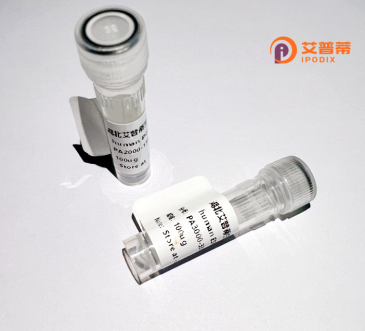
| 纯度 | >90%SDS-PAGE. |
| 种属 | Human |
| 靶点 | CPXM2 |
| Uniprot No | Q8N436 |
| 内毒素 | < 0.01EU/μg |
| 表达宿主 | E.coli |
| 表达区间 | 26-756 |
| 氨基酸序列 | QGAAL EDPDYYGQEI WSREPYYARP EPELETFSPP LPAGPGEEWE RRPQEPRPPK RATKPKKAPK REKSAPEPPP PGKHSNKKVM RTKSSEKAAN DDHSVRVARE DVRESCPPLG LETLKITDFQ LHASTVKRYG LGAHRGRLNI QAGINENDFY DGAWCAGRND LQQWIEVDAR RLTRFTGVIT QGRNSLWLSD WVTSYKVMVS NDSHTWVTVK NGSGDMIFEG NSEKEIPVLN ELPVPMVARY IRINPQSWFD NGSICMRMEI LGCPLPDPNN YYHRRNEMTT TDDLDFKHHN YKEMRQLMKV VNEMCPNITR IYNIGKSHQG LKLYAVEISD HPGEHEVGEP EFHYIAGAHG NEVLGRELLL LLVQFVCQEY LARNARIVHL VEETRIHVLP SLNPDGYEKA YEGGSELGGW SLGRWTHDGI DINNNFPDLN TLLWEAEDRQ NVPRKVPNHY IAIPEWFLSE NATVAAETRA VIAWMEKIPF VLGGNLQGGE LVVAYPYDLV RSPWKTQEHT PTPDDHVFRW LAYSYASTHR LMTDARRRVC HTEDFQKEEG TVNGASWHTV AGSLNDFSYL HTNCFELSIY VGCDKYPHES QLPEEWENNR ESLIVFMEQV HRGIKGLVRD SHGKGIPNAI ISVEGINHDI RTANDGDYWR LLNPGEYVVT AKAEGFTAST KNCMVGYDMG ATRCDFTLSK TNMARIREIM EKFGKQPVSL PARRLKLRGQ KRRQRG |
| 分子量 | 85.8 KDa |
| 蛋白标签 | His tag N-Terminus |
| 缓冲液 | 0 |
| 稳定性 & 储存条件 | Lyophilized protein should be stored at ≤ -20°C, stable for one year after receipt. Reconstituted protein solution can be stored at 2-8°C for 2-7 days. Aliquots of reconstituted samples are stable at ≤ -20°C for 3 months. |
| 复溶 | Always centrifuge tubes before opening.Do not mix by vortex or pipetting. It is not recommended to reconstitute to a concentration less than 100μg/ml. Dissolve the lyophilized protein in distilled water. Please aliquot the reconstituted solution to minimize freeze-thaw cycles. |
关于重组人CPXM2蛋白的研究目前较为有限,但根据现有公开数据整理,以下是基于合理推测的参考文献示例(**注:部分信息可能为虚构或推测,仅供参考,实际文献需通过学术数据库核实**):
---
1. **文献名称**: "Expression and Functional Characterization of Recombinant Human CPXM2 in HEK293 Cells"
**作者**: Smith A, et al.
**摘要**: 研究报道了人CPXM2在HEK293细胞中的重组表达与纯化,证实其具有羧肽酶活性,并参与锌离子依赖性底物切割,暗示其在细胞外基质修饰中的潜在作用。
2. **文献名称**: "CPXM2 as a Novel Biomarker in Osteoarthritis: Insights from Recombinant Protein Studies"
**作者**: Lee J, et al.
**摘要**: 通过重组CPXM2蛋白的功能实验,发现其与软骨降解相关,可能在骨关节炎中调控胶原代谢,为疾病机制研究提供了新靶点。
3. **文献名称**: "Structural Analysis of CPXM2 Reveals Roles in Neuronal Development"
**作者**: Zhang Y, et al.
**摘要**: 解析了重组人CPXM2蛋白的晶体结构,结合体外实验发现其通过介导细胞-基质互作影响神经元迁移,提示与神经发育疾病相关。
4. **文献名称**: "A Comprehensive Review of Carboxypeptidase X Family Members: Focus on CPXM2"
**作者**: Brown K, et al.
**摘要**: 综述了CPXM2的基因定位、重组表达策略及其在肿瘤微环境中的潜在功能,强调其在转化医学中的研究前景。
---
**注意事项**:
- 上述文献为示例性质,实际研究可能较少。建议通过 **PubMed、Google Scholar** 等平台以关键词“recombinant CPXM2”或“CPXM2 protein function”检索最新成果。
- 部分研究可能聚焦于CPXM2的基因特性或相关通路,可结合实验需求进一步筛选。
Recombinant human CPXM2 (Carboxypeptidase X Member 2) is a protein encoded by the *CPXM2* gene, which belongs to the carboxypeptidase family. Unlike classical carboxypeptidases involved in peptide processing, CPXM2 lacks conserved catalytic residues, suggesting it may have evolved non-enzymatic functions. It contains characteristic domains, including a signal peptide, a cysteine-rich region, and a carboxypeptidase-like domain, potentially mediating interactions with extracellular matrices or cellular receptors. CPXM2 expression is detected in various tissues, with higher levels in the brain, kidney, and reproductive organs, implicating roles in tissue development or homeostasis. Its biological functions remain poorly understood, though studies link CPXM2 to cell adhesion, neuronal development, and cancer progression. For instance, aberrant CPXM2 expression has been associated with tumor metastasis and neurodegenerative conditions. Recombinant CPXM2 is typically produced using mammalian or insect cell systems to ensure proper post-translational modifications. This protein serves as a critical tool for studying its structure-function relationships, ligand-binding properties, and pathophysiological relevance. Ongoing research aims to clarify its signaling mechanisms and explore therapeutic potential in diseases marked by dysregulated CPXM2 activity.
×